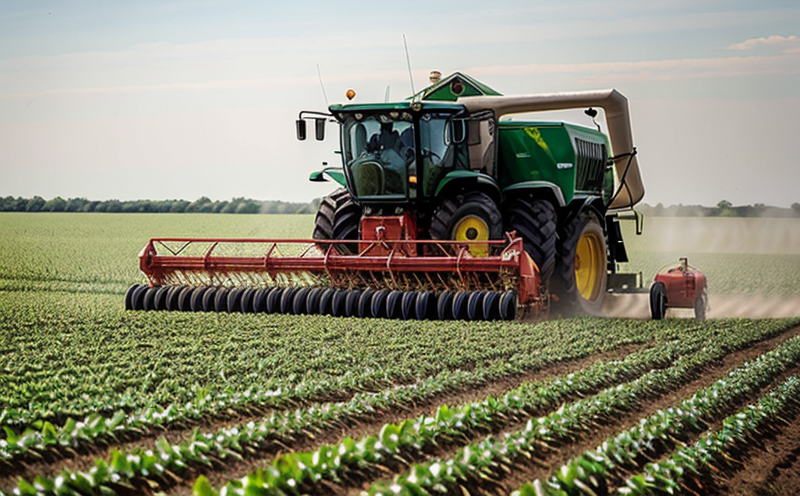Crop Stress Tolerance Testing (Drought)
The ability of crops to withstand environmental stress is a critical factor in ensuring food security and sustainable agricultural practices. Drought stress tolerance testing plays an essential role in understanding the resilience of crops under water-limited conditions, which are becoming increasingly common due to climate change. This service focuses on evaluating how different crop varieties respond to prolonged periods without adequate water supply.
At Eurolab, we employ advanced techniques and state-of-the-art equipment to simulate drought stress environments accurately. Our testing protocols closely follow international standards such as ISO 16143-2, which ensures the reliability and reproducibility of our results. The process involves controlled conditions where crops are exposed to varying degrees of moisture deprivation over specified durations.
The first step in conducting this test is preparing the crop samples correctly. This includes selecting representative plants or seeds that reflect typical field conditions. Once prepared, these specimens are then placed into specially designed chambers equipped with sensors capable of monitoring multiple parameters including soil moisture content, air humidity levels, temperature fluctuations, and CO2 concentration.
Throughout the duration of the test, continuous data collection allows us to observe changes in plant morphology, physiological responses, and yield performance. Key indicators monitored include leaf water potential, stomatal conductance, chlorophyll fluorescence, biomass accumulation rates, flowering time delay, fruit set percentage, and grain quality metrics.
After completing the experimental phase, we analyze all collected data using sophisticated statistical methods to determine which traits contribute most significantly to drought resistance. Based on these findings, recommendations can be made regarding breeding programs aimed at developing new varieties better adapted to harsher growing conditions.
Drought stress tolerance testing not only aids in improving crop resilience but also contributes valuable information for developing sustainable agricultural practices. By identifying plants with higher thresholds of tolerance, farmers can make informed decisions about planting schedules and irrigation strategies. Moreover, this knowledge helps researchers focus their efforts on genetically diverse materials that may possess unique protective mechanisms against water scarcity.
Understanding drought stress resistance is crucial given the projected increase in frequency and intensity of extreme weather events worldwide. As global temperatures rise, so too does the likelihood of extended dry spells affecting agricultural productivity significantly. Therefore, investing time and resources into evaluating crop performance under stressed conditions will prove beneficial both economically and environmentally.
Benefits
- Enhanced Crop Resilience: Identifies varieties capable of thriving in arid regions or during periods of limited rainfall, reducing yield losses due to drought.
- Sustainable Agricultural Practices: Provides insights into efficient water usage patterns, promoting eco-friendly farming methods.
- Breeding Programs: Supports the development of new crop varieties resistant to environmental stressors through targeted genetic modifications.
- Precision Agriculture: Enables farmers to tailor their cultivation practices according to local weather patterns, optimizing resource allocation.
The results from these tests empower stakeholders across various sectors including government agencies responsible for food security initiatives, seed companies looking to improve product offerings, and academic institutions conducting research into climate change impacts on agriculture.
Eurolab Advantages
- Accurate Simulations: Utilizes precise control systems ensuring that simulated drought conditions mimic real-world scenarios accurately.
- Comprehensive Data Analysis: Employs robust statistical tools to interpret large datasets comprehensively, providing actionable insights.
- Expertise and Experience: Leveraging years of experience in agricultural testing, our team offers unparalleled knowledge in interpreting results correctly.
- Regulatory Compliance: Ensures adherence to relevant international standards like ISO 16143-2, guaranteeing the validity of test outcomes.
We pride ourselves on delivering top-tier services backed by rigorous methodologies and cutting-edge technology. Whether you're a researcher seeking innovative solutions or an industry professional aiming for sustainable growth, Eurolab is committed to providing accurate, reliable, and actionable data supporting informed decision-making processes within your organization.
Environmental and Sustainability Contributions
- Water Conservation: By identifying crops that require less water to achieve optimal yields, this service promotes efficient irrigation practices, conserving valuable resources.
- Biodiversity Enhancement: Encourages the cultivation of diverse plant species that can thrive in challenging environments, fostering greater biodiversity within ecosystems.
- Emission Reduction: Supports sustainable farming techniques that minimize greenhouse gas emissions associated with conventional agricultural practices.
- Risk Mitigation: Helps farmers prepare for unpredictable weather patterns by selecting crops less susceptible to drought impacts, thereby reducing economic risks.
Drought stress tolerance testing contributes positively towards achieving global goals related to climate change mitigation and sustainable development. Through our rigorous assessments, we help create a more resilient food supply chain capable of withstanding future challenges posed by changing climates.





